Volkswagen Emissions Scandal Analysis
VerifiedAdded on 2020/11/12
|8
|2289
|277
AI Summary
This assignment requires a critical analysis of the Volkswagen emissions scandal, highlighting the company's failure to maintain corporate ethics and the consequences that followed. It also presents recommendations for Volkswagen to improve its brand image by emphasizing sustainability, business unit management, and trust-building with customers. The analysis aims to provide insights into the importance of ethical practices in business operations.
Contribute Materials
Your contribution can guide someone’s learning journey. Share your
documents today.
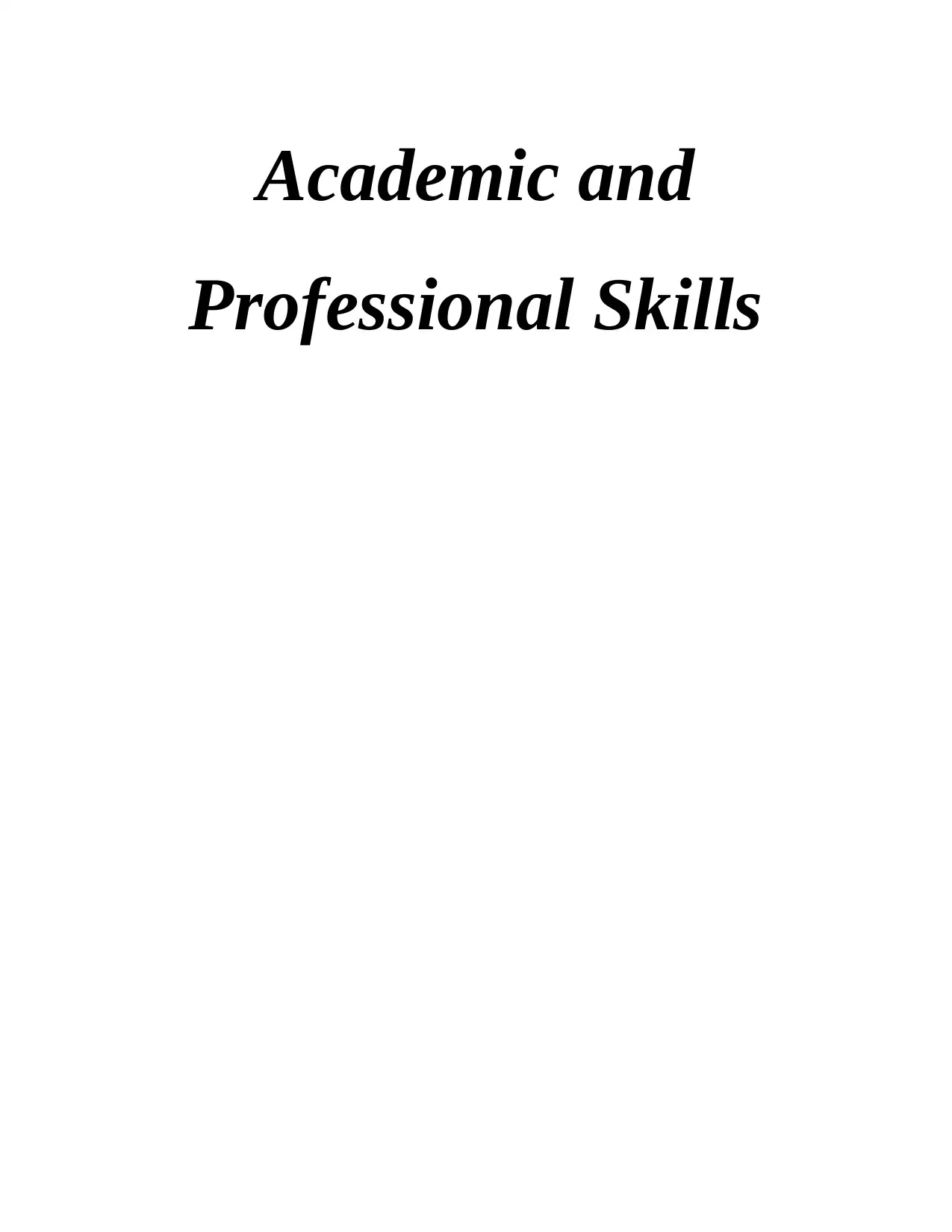
Academic and
Professional Skills
Professional Skills
Secure Best Marks with AI Grader
Need help grading? Try our AI Grader for instant feedback on your assignments.
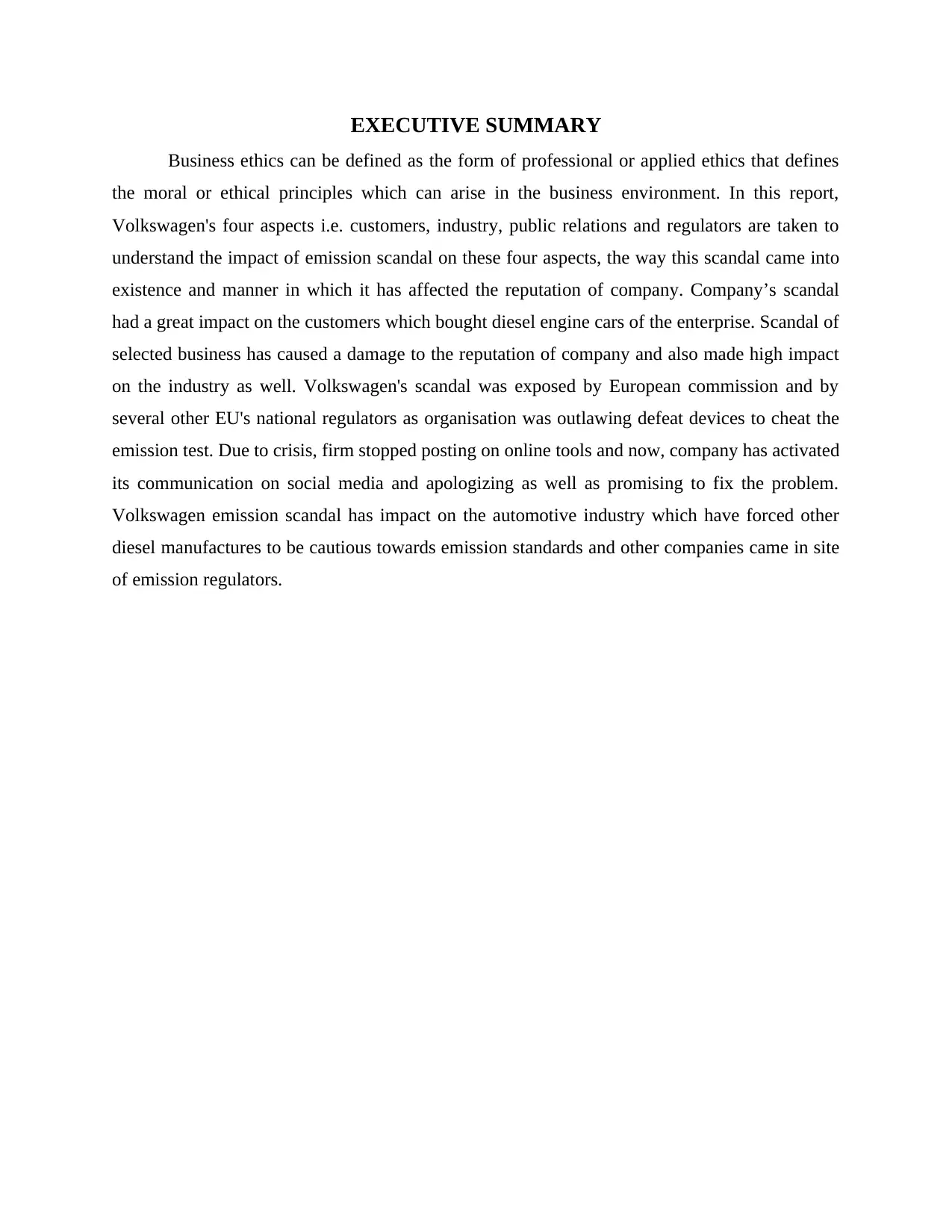
EXECUTIVE SUMMARY
Business ethics can be defined as the form of professional or applied ethics that defines
the moral or ethical principles which can arise in the business environment. In this report,
Volkswagen's four aspects i.e. customers, industry, public relations and regulators are taken to
understand the impact of emission scandal on these four aspects, the way this scandal came into
existence and manner in which it has affected the reputation of company. Company’s scandal
had a great impact on the customers which bought diesel engine cars of the enterprise. Scandal of
selected business has caused a damage to the reputation of company and also made high impact
on the industry as well. Volkswagen's scandal was exposed by European commission and by
several other EU's national regulators as organisation was outlawing defeat devices to cheat the
emission test. Due to crisis, firm stopped posting on online tools and now, company has activated
its communication on social media and apologizing as well as promising to fix the problem.
Volkswagen emission scandal has impact on the automotive industry which have forced other
diesel manufactures to be cautious towards emission standards and other companies came in site
of emission regulators.
Business ethics can be defined as the form of professional or applied ethics that defines
the moral or ethical principles which can arise in the business environment. In this report,
Volkswagen's four aspects i.e. customers, industry, public relations and regulators are taken to
understand the impact of emission scandal on these four aspects, the way this scandal came into
existence and manner in which it has affected the reputation of company. Company’s scandal
had a great impact on the customers which bought diesel engine cars of the enterprise. Scandal of
selected business has caused a damage to the reputation of company and also made high impact
on the industry as well. Volkswagen's scandal was exposed by European commission and by
several other EU's national regulators as organisation was outlawing defeat devices to cheat the
emission test. Due to crisis, firm stopped posting on online tools and now, company has activated
its communication on social media and apologizing as well as promising to fix the problem.
Volkswagen emission scandal has impact on the automotive industry which have forced other
diesel manufactures to be cautious towards emission standards and other companies came in site
of emission regulators.
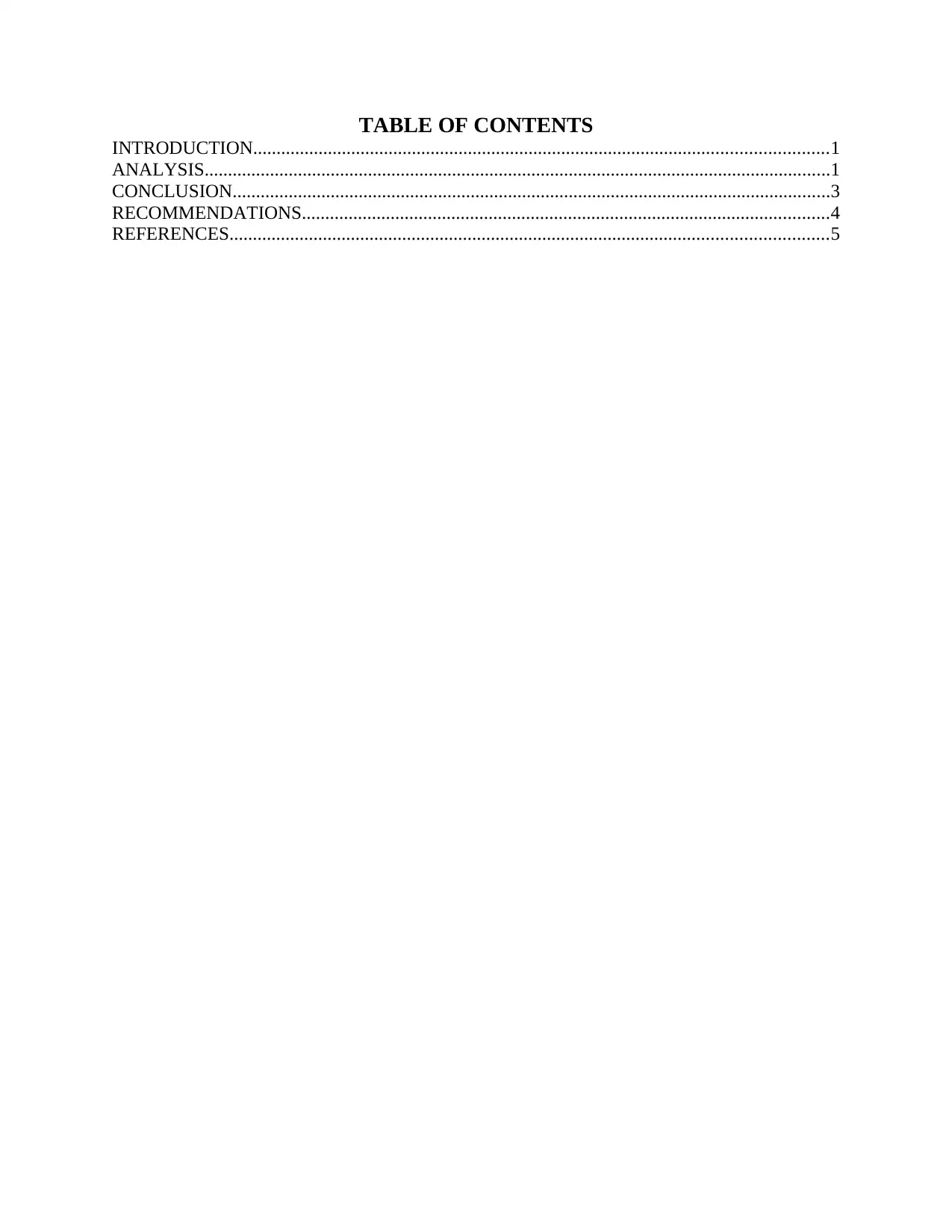
TABLE OF CONTENTS
INTRODUCTION...........................................................................................................................1
ANALYSIS......................................................................................................................................1
CONCLUSION................................................................................................................................3
RECOMMENDATIONS.................................................................................................................4
REFERENCES................................................................................................................................5
INTRODUCTION...........................................................................................................................1
ANALYSIS......................................................................................................................................1
CONCLUSION................................................................................................................................3
RECOMMENDATIONS.................................................................................................................4
REFERENCES................................................................................................................................5
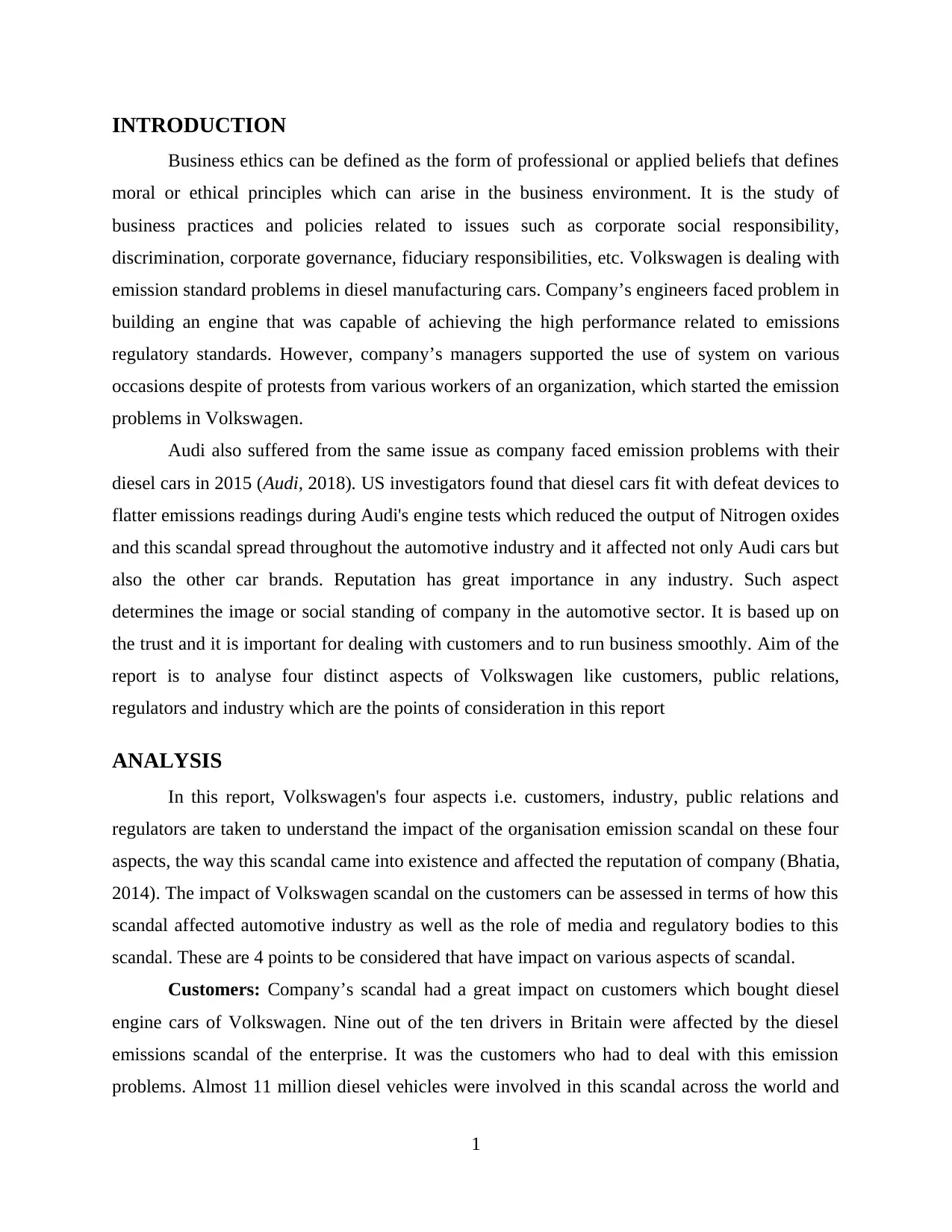
INTRODUCTION
Business ethics can be defined as the form of professional or applied beliefs that defines
moral or ethical principles which can arise in the business environment. It is the study of
business practices and policies related to issues such as corporate social responsibility,
discrimination, corporate governance, fiduciary responsibilities, etc. Volkswagen is dealing with
emission standard problems in diesel manufacturing cars. Company’s engineers faced problem in
building an engine that was capable of achieving the high performance related to emissions
regulatory standards. However, company’s managers supported the use of system on various
occasions despite of protests from various workers of an organization, which started the emission
problems in Volkswagen.
Audi also suffered from the same issue as company faced emission problems with their
diesel cars in 2015 (Audi, 2018). US investigators found that diesel cars fit with defeat devices to
flatter emissions readings during Audi's engine tests which reduced the output of Nitrogen oxides
and this scandal spread throughout the automotive industry and it affected not only Audi cars but
also the other car brands. Reputation has great importance in any industry. Such aspect
determines the image or social standing of company in the automotive sector. It is based up on
the trust and it is important for dealing with customers and to run business smoothly. Aim of the
report is to analyse four distinct aspects of Volkswagen like customers, public relations,
regulators and industry which are the points of consideration in this report
ANALYSIS
In this report, Volkswagen's four aspects i.e. customers, industry, public relations and
regulators are taken to understand the impact of the organisation emission scandal on these four
aspects, the way this scandal came into existence and affected the reputation of company (Bhatia,
2014). The impact of Volkswagen scandal on the customers can be assessed in terms of how this
scandal affected automotive industry as well as the role of media and regulatory bodies to this
scandal. These are 4 points to be considered that have impact on various aspects of scandal.
Customers: Company’s scandal had a great impact on customers which bought diesel
engine cars of Volkswagen. Nine out of the ten drivers in Britain were affected by the diesel
emissions scandal of the enterprise. It was the customers who had to deal with this emission
problems. Almost 11 million diesel vehicles were involved in this scandal across the world and
1
Business ethics can be defined as the form of professional or applied beliefs that defines
moral or ethical principles which can arise in the business environment. It is the study of
business practices and policies related to issues such as corporate social responsibility,
discrimination, corporate governance, fiduciary responsibilities, etc. Volkswagen is dealing with
emission standard problems in diesel manufacturing cars. Company’s engineers faced problem in
building an engine that was capable of achieving the high performance related to emissions
regulatory standards. However, company’s managers supported the use of system on various
occasions despite of protests from various workers of an organization, which started the emission
problems in Volkswagen.
Audi also suffered from the same issue as company faced emission problems with their
diesel cars in 2015 (Audi, 2018). US investigators found that diesel cars fit with defeat devices to
flatter emissions readings during Audi's engine tests which reduced the output of Nitrogen oxides
and this scandal spread throughout the automotive industry and it affected not only Audi cars but
also the other car brands. Reputation has great importance in any industry. Such aspect
determines the image or social standing of company in the automotive sector. It is based up on
the trust and it is important for dealing with customers and to run business smoothly. Aim of the
report is to analyse four distinct aspects of Volkswagen like customers, public relations,
regulators and industry which are the points of consideration in this report
ANALYSIS
In this report, Volkswagen's four aspects i.e. customers, industry, public relations and
regulators are taken to understand the impact of the organisation emission scandal on these four
aspects, the way this scandal came into existence and affected the reputation of company (Bhatia,
2014). The impact of Volkswagen scandal on the customers can be assessed in terms of how this
scandal affected automotive industry as well as the role of media and regulatory bodies to this
scandal. These are 4 points to be considered that have impact on various aspects of scandal.
Customers: Company’s scandal had a great impact on customers which bought diesel
engine cars of Volkswagen. Nine out of the ten drivers in Britain were affected by the diesel
emissions scandal of the enterprise. It was the customers who had to deal with this emission
problems. Almost 11 million diesel vehicles were involved in this scandal across the world and
1
Secure Best Marks with AI Grader
Need help grading? Try our AI Grader for instant feedback on your assignments.

1.2 million in Britain and the customers believe that they should be compensated which has
increased the pressure on the enterprise. Customer’s frustration is increasing due to the lack of
information about the repairs to be made by the enterprise. Volkswagen have sent letters to the
effected customers and this letter stated that company is still working on the plan and the
organisation will send another letter after they figure out the solution to the problem.
Volkswagen have deployed the self service solutions that could support up to 40 percent
of the customer enquires in the real time (Huss, Jhileek and Butler, 2017). The chosen company
is building a transparency ever before in order to gain trust of the customers once again and is
also offering convenient service solution to address the customer enquiries. Cited firm has to
keep their customers up to date and informed for gaining the trust of the customers otherwise it
would damage the customer’s loyalty and also the brand loyalty in long term. So selected
business scandal had impact on company and customers as well which has led the gap between
the two.
Industry or Sector: Volkswagen scandal has caused a damage to the reputation of
company and has also made an adverse impact on the industry. This scandal has decreased sales
of diesel cars in European countries and industry is worrying about future of automotive cars in
these nations. This has lowered demands of diesel cars in Britain and also decreased sales
volume of diesel cars in this sector. When Volkswagen admitted that 11 million cars are involved
in the scandal as a result, a major group of investors asked for the explanation about their
emission standards from the companies they have invested in (Volkswagen, 2018). This emission
scandal has also affected the other companies that built diesel engine from 2009 to 2015 which
includes Audi, Skoda, etc. It is because of this incident, other diesel engine manufacturing
companies have become cautious about their emission standards and are working to improve it.
So, this incident has an impact on the automotive industry (Moffett and Mill, 2014).
Regulators: Volkswagen's scandal was exposed by the European commission and by
several other EU's national regulators, as cited firm was outlawing the defeat devices to cheat the
emission test. European Unions and commissions have persuaded all the state members to make
an investigation how these companies are using illegal defeat devices in order to cheat the
emission test as done by Volkswagen. British transport minister said that British government will
work with car manufactures for ensuring the use of emission cheating software are not been used
in this industry. European Union regulators suggested that they will make contact with US
2
increased the pressure on the enterprise. Customer’s frustration is increasing due to the lack of
information about the repairs to be made by the enterprise. Volkswagen have sent letters to the
effected customers and this letter stated that company is still working on the plan and the
organisation will send another letter after they figure out the solution to the problem.
Volkswagen have deployed the self service solutions that could support up to 40 percent
of the customer enquires in the real time (Huss, Jhileek and Butler, 2017). The chosen company
is building a transparency ever before in order to gain trust of the customers once again and is
also offering convenient service solution to address the customer enquiries. Cited firm has to
keep their customers up to date and informed for gaining the trust of the customers otherwise it
would damage the customer’s loyalty and also the brand loyalty in long term. So selected
business scandal had impact on company and customers as well which has led the gap between
the two.
Industry or Sector: Volkswagen scandal has caused a damage to the reputation of
company and has also made an adverse impact on the industry. This scandal has decreased sales
of diesel cars in European countries and industry is worrying about future of automotive cars in
these nations. This has lowered demands of diesel cars in Britain and also decreased sales
volume of diesel cars in this sector. When Volkswagen admitted that 11 million cars are involved
in the scandal as a result, a major group of investors asked for the explanation about their
emission standards from the companies they have invested in (Volkswagen, 2018). This emission
scandal has also affected the other companies that built diesel engine from 2009 to 2015 which
includes Audi, Skoda, etc. It is because of this incident, other diesel engine manufacturing
companies have become cautious about their emission standards and are working to improve it.
So, this incident has an impact on the automotive industry (Moffett and Mill, 2014).
Regulators: Volkswagen's scandal was exposed by the European commission and by
several other EU's national regulators, as cited firm was outlawing the defeat devices to cheat the
emission test. European Unions and commissions have persuaded all the state members to make
an investigation how these companies are using illegal defeat devices in order to cheat the
emission test as done by Volkswagen. British transport minister said that British government will
work with car manufactures for ensuring the use of emission cheating software are not been used
in this industry. European Union regulators suggested that they will make contact with US
2
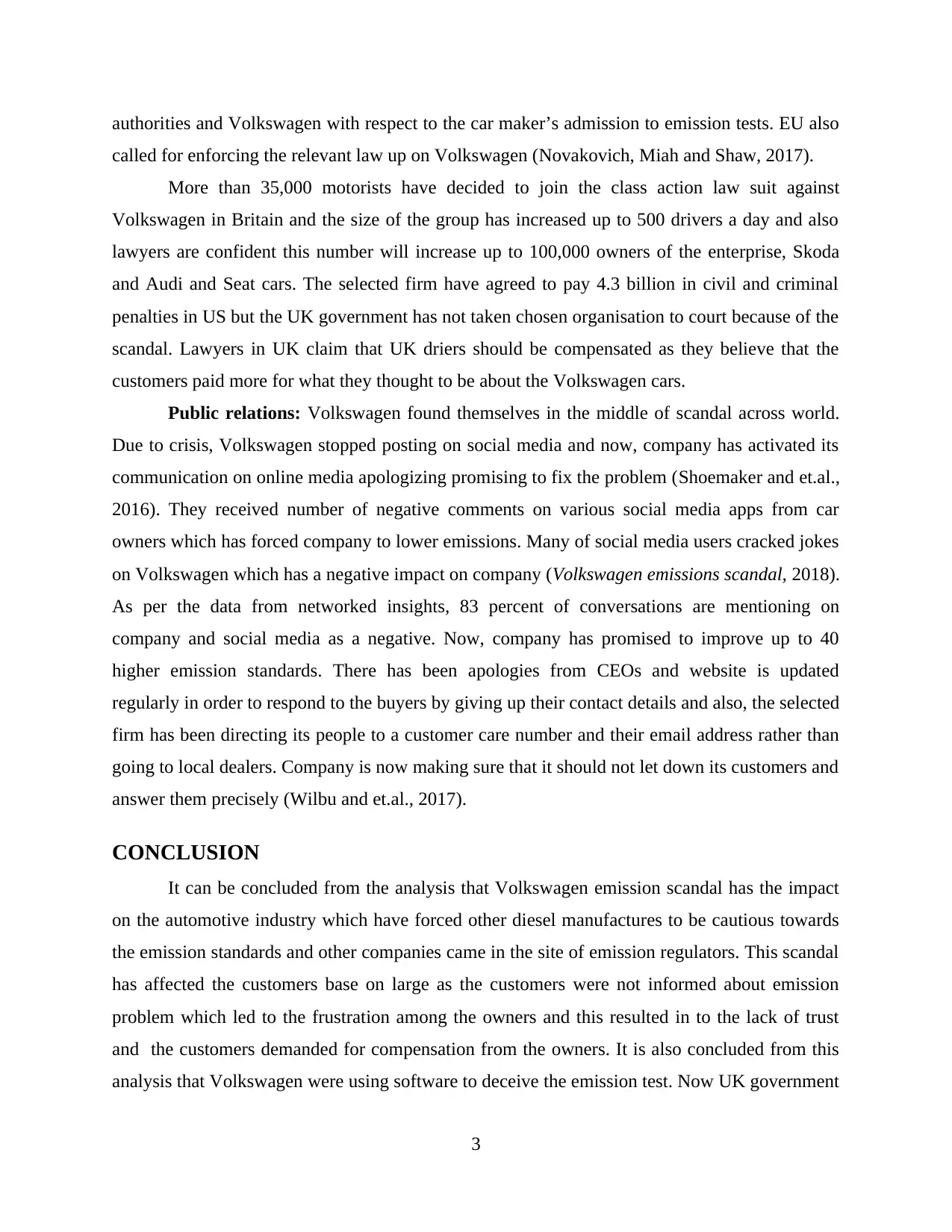
authorities and Volkswagen with respect to the car maker’s admission to emission tests. EU also
called for enforcing the relevant law up on Volkswagen (Novakovich, Miah and Shaw, 2017).
More than 35,000 motorists have decided to join the class action law suit against
Volkswagen in Britain and the size of the group has increased up to 500 drivers a day and also
lawyers are confident this number will increase up to 100,000 owners of the enterprise, Skoda
and Audi and Seat cars. The selected firm have agreed to pay 4.3 billion in civil and criminal
penalties in US but the UK government has not taken chosen organisation to court because of the
scandal. Lawyers in UK claim that UK driers should be compensated as they believe that the
customers paid more for what they thought to be about the Volkswagen cars.
Public relations: Volkswagen found themselves in the middle of scandal across world.
Due to crisis, Volkswagen stopped posting on social media and now, company has activated its
communication on online media apologizing promising to fix the problem (Shoemaker and et.al.,
2016). They received number of negative comments on various social media apps from car
owners which has forced company to lower emissions. Many of social media users cracked jokes
on Volkswagen which has a negative impact on company (Volkswagen emissions scandal, 2018).
As per the data from networked insights, 83 percent of conversations are mentioning on
company and social media as a negative. Now, company has promised to improve up to 40
higher emission standards. There has been apologies from CEOs and website is updated
regularly in order to respond to the buyers by giving up their contact details and also, the selected
firm has been directing its people to a customer care number and their email address rather than
going to local dealers. Company is now making sure that it should not let down its customers and
answer them precisely (Wilbu and et.al., 2017).
CONCLUSION
It can be concluded from the analysis that Volkswagen emission scandal has the impact
on the automotive industry which have forced other diesel manufactures to be cautious towards
the emission standards and other companies came in the site of emission regulators. This scandal
has affected the customers base on large as the customers were not informed about emission
problem which led to the frustration among the owners and this resulted in to the lack of trust
and the customers demanded for compensation from the owners. It is also concluded from this
analysis that Volkswagen were using software to deceive the emission test. Now UK government
3
called for enforcing the relevant law up on Volkswagen (Novakovich, Miah and Shaw, 2017).
More than 35,000 motorists have decided to join the class action law suit against
Volkswagen in Britain and the size of the group has increased up to 500 drivers a day and also
lawyers are confident this number will increase up to 100,000 owners of the enterprise, Skoda
and Audi and Seat cars. The selected firm have agreed to pay 4.3 billion in civil and criminal
penalties in US but the UK government has not taken chosen organisation to court because of the
scandal. Lawyers in UK claim that UK driers should be compensated as they believe that the
customers paid more for what they thought to be about the Volkswagen cars.
Public relations: Volkswagen found themselves in the middle of scandal across world.
Due to crisis, Volkswagen stopped posting on social media and now, company has activated its
communication on online media apologizing promising to fix the problem (Shoemaker and et.al.,
2016). They received number of negative comments on various social media apps from car
owners which has forced company to lower emissions. Many of social media users cracked jokes
on Volkswagen which has a negative impact on company (Volkswagen emissions scandal, 2018).
As per the data from networked insights, 83 percent of conversations are mentioning on
company and social media as a negative. Now, company has promised to improve up to 40
higher emission standards. There has been apologies from CEOs and website is updated
regularly in order to respond to the buyers by giving up their contact details and also, the selected
firm has been directing its people to a customer care number and their email address rather than
going to local dealers. Company is now making sure that it should not let down its customers and
answer them precisely (Wilbu and et.al., 2017).
CONCLUSION
It can be concluded from the analysis that Volkswagen emission scandal has the impact
on the automotive industry which have forced other diesel manufactures to be cautious towards
the emission standards and other companies came in the site of emission regulators. This scandal
has affected the customers base on large as the customers were not informed about emission
problem which led to the frustration among the owners and this resulted in to the lack of trust
and the customers demanded for compensation from the owners. It is also concluded from this
analysis that Volkswagen were using software to deceive the emission test. Now UK government
3
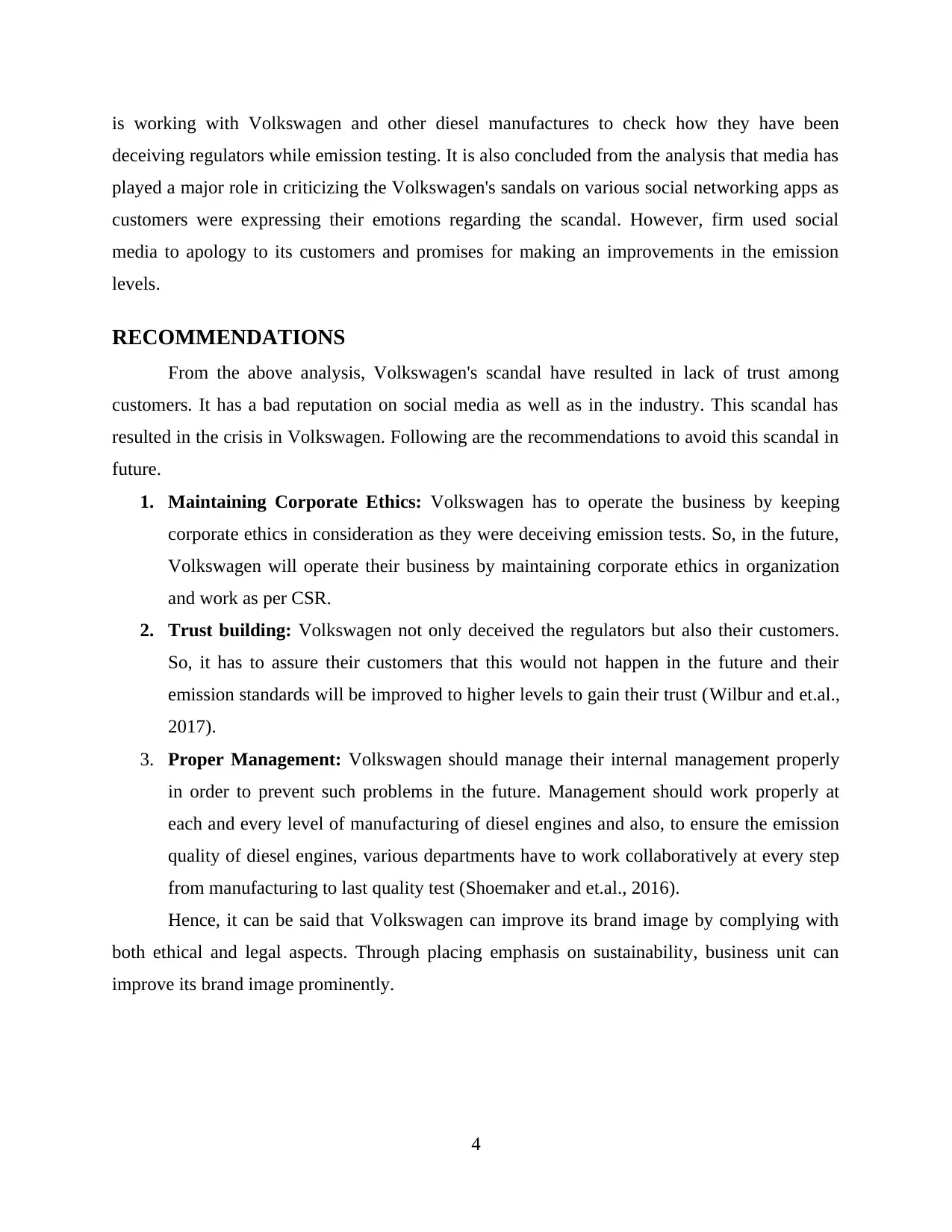
is working with Volkswagen and other diesel manufactures to check how they have been
deceiving regulators while emission testing. It is also concluded from the analysis that media has
played a major role in criticizing the Volkswagen's sandals on various social networking apps as
customers were expressing their emotions regarding the scandal. However, firm used social
media to apology to its customers and promises for making an improvements in the emission
levels.
RECOMMENDATIONS
From the above analysis, Volkswagen's scandal have resulted in lack of trust among
customers. It has a bad reputation on social media as well as in the industry. This scandal has
resulted in the crisis in Volkswagen. Following are the recommendations to avoid this scandal in
future.
1. Maintaining Corporate Ethics: Volkswagen has to operate the business by keeping
corporate ethics in consideration as they were deceiving emission tests. So, in the future,
Volkswagen will operate their business by maintaining corporate ethics in organization
and work as per CSR.
2. Trust building: Volkswagen not only deceived the regulators but also their customers.
So, it has to assure their customers that this would not happen in the future and their
emission standards will be improved to higher levels to gain their trust (Wilbur and et.al.,
2017).
3. Proper Management: Volkswagen should manage their internal management properly
in order to prevent such problems in the future. Management should work properly at
each and every level of manufacturing of diesel engines and also, to ensure the emission
quality of diesel engines, various departments have to work collaboratively at every step
from manufacturing to last quality test (Shoemaker and et.al., 2016).
Hence, it can be said that Volkswagen can improve its brand image by complying with
both ethical and legal aspects. Through placing emphasis on sustainability, business unit can
improve its brand image prominently.
4
deceiving regulators while emission testing. It is also concluded from the analysis that media has
played a major role in criticizing the Volkswagen's sandals on various social networking apps as
customers were expressing their emotions regarding the scandal. However, firm used social
media to apology to its customers and promises for making an improvements in the emission
levels.
RECOMMENDATIONS
From the above analysis, Volkswagen's scandal have resulted in lack of trust among
customers. It has a bad reputation on social media as well as in the industry. This scandal has
resulted in the crisis in Volkswagen. Following are the recommendations to avoid this scandal in
future.
1. Maintaining Corporate Ethics: Volkswagen has to operate the business by keeping
corporate ethics in consideration as they were deceiving emission tests. So, in the future,
Volkswagen will operate their business by maintaining corporate ethics in organization
and work as per CSR.
2. Trust building: Volkswagen not only deceived the regulators but also their customers.
So, it has to assure their customers that this would not happen in the future and their
emission standards will be improved to higher levels to gain their trust (Wilbur and et.al.,
2017).
3. Proper Management: Volkswagen should manage their internal management properly
in order to prevent such problems in the future. Management should work properly at
each and every level of manufacturing of diesel engines and also, to ensure the emission
quality of diesel engines, various departments have to work collaboratively at every step
from manufacturing to last quality test (Shoemaker and et.al., 2016).
Hence, it can be said that Volkswagen can improve its brand image by complying with
both ethical and legal aspects. Through placing emphasis on sustainability, business unit can
improve its brand image prominently.
4
Paraphrase This Document
Need a fresh take? Get an instant paraphrase of this document with our AI Paraphraser
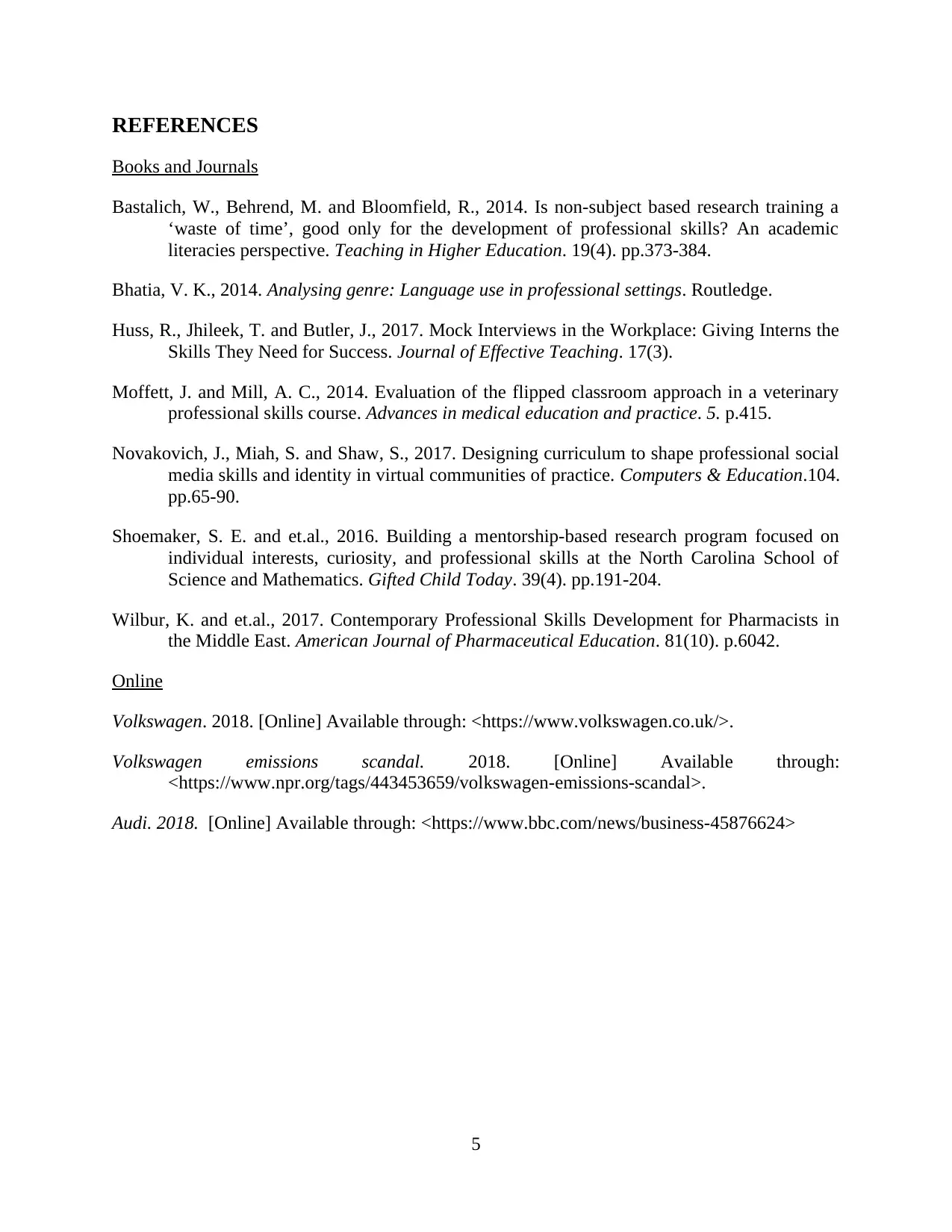
REFERENCES
Books and Journals
Bastalich, W., Behrend, M. and Bloomfield, R., 2014. Is non-subject based research training a
‘waste of time’, good only for the development of professional skills? An academic
literacies perspective. Teaching in Higher Education. 19(4). pp.373-384.
Bhatia, V. K., 2014. Analysing genre: Language use in professional settings. Routledge.
Huss, R., Jhileek, T. and Butler, J., 2017. Mock Interviews in the Workplace: Giving Interns the
Skills They Need for Success. Journal of Effective Teaching. 17(3).
Moffett, J. and Mill, A. C., 2014. Evaluation of the flipped classroom approach in a veterinary
professional skills course. Advances in medical education and practice. 5. p.415.
Novakovich, J., Miah, S. and Shaw, S., 2017. Designing curriculum to shape professional social
media skills and identity in virtual communities of practice. Computers & Education.104.
pp.65-90.
Shoemaker, S. E. and et.al., 2016. Building a mentorship-based research program focused on
individual interests, curiosity, and professional skills at the North Carolina School of
Science and Mathematics. Gifted Child Today. 39(4). pp.191-204.
Wilbur, K. and et.al., 2017. Contemporary Professional Skills Development for Pharmacists in
the Middle East. American Journal of Pharmaceutical Education. 81(10). p.6042.
Online
Volkswagen. 2018. [Online] Available through: <https://www.volkswagen.co.uk/>.
Volkswagen emissions scandal. 2018. [Online] Available through:
<https://www.npr.org/tags/443453659/volkswagen-emissions-scandal>.
Audi. 2018. [Online] Available through: <https://www.bbc.com/news/business-45876624>
5
Books and Journals
Bastalich, W., Behrend, M. and Bloomfield, R., 2014. Is non-subject based research training a
‘waste of time’, good only for the development of professional skills? An academic
literacies perspective. Teaching in Higher Education. 19(4). pp.373-384.
Bhatia, V. K., 2014. Analysing genre: Language use in professional settings. Routledge.
Huss, R., Jhileek, T. and Butler, J., 2017. Mock Interviews in the Workplace: Giving Interns the
Skills They Need for Success. Journal of Effective Teaching. 17(3).
Moffett, J. and Mill, A. C., 2014. Evaluation of the flipped classroom approach in a veterinary
professional skills course. Advances in medical education and practice. 5. p.415.
Novakovich, J., Miah, S. and Shaw, S., 2017. Designing curriculum to shape professional social
media skills and identity in virtual communities of practice. Computers & Education.104.
pp.65-90.
Shoemaker, S. E. and et.al., 2016. Building a mentorship-based research program focused on
individual interests, curiosity, and professional skills at the North Carolina School of
Science and Mathematics. Gifted Child Today. 39(4). pp.191-204.
Wilbur, K. and et.al., 2017. Contemporary Professional Skills Development for Pharmacists in
the Middle East. American Journal of Pharmaceutical Education. 81(10). p.6042.
Online
Volkswagen. 2018. [Online] Available through: <https://www.volkswagen.co.uk/>.
Volkswagen emissions scandal. 2018. [Online] Available through:
<https://www.npr.org/tags/443453659/volkswagen-emissions-scandal>.
Audi. 2018. [Online] Available through: <https://www.bbc.com/news/business-45876624>
5
1 out of 8
Related Documents
Your All-in-One AI-Powered Toolkit for Academic Success.
+13062052269
info@desklib.com
Available 24*7 on WhatsApp / Email
![[object Object]](/_next/static/media/star-bottom.7253800d.svg)
Unlock your academic potential
© 2024 | Zucol Services PVT LTD | All rights reserved.





